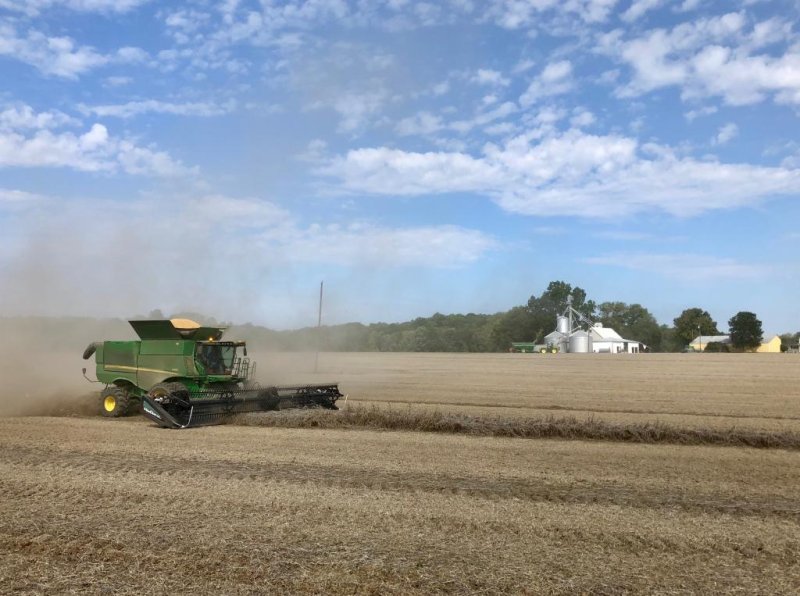An Indiana farmer harvests soybeans. Photo by Jessie Higgins/UPI
Dec. 11 (UPI) -- After months of negotiations, federal lawmakers have compromised on a new farm bill, putting the legislation on track to be passed by both the House and Senate this week.
The compromise bill, unveiled Monday night, leaves out controversial work requirements for food stamp recipients that were part of the House version of the bill -- a key sticking point during negotiations. It also maintains conservation programs the House bill proposed eliminating.
"It seems to generally, with a few exceptions, maintain programs as they have been in the past," said Erika Dunyak, a clinical fellow at the Harvard Law School Food Law and Policy Clinic.
The previous Farm Bill expired Sept. 30, after a joint House and Senate committee failed to compromise on the legislation. The House and Senate had passed strikingly different bills. After its expiration, dozens of programs went on hold.
Farmers and groups who rely on the programs feared they would languish another year if lawmakers didn't compromise during this year's lame duck session, before a new House and Senate start over in 2019.
Both chambers plan to vote on the $867 billion bill this week. If it passes, the bill will go to President Donald Trump for approval.
"There are some really great things in this bill," said Ferd Hoefner, a senior adviser for the National Sustainable Agriculture Coalition.
The bill gives greater support for the struggling dairy industry. It also legalizes industrial hemp production by removing it from the federal government's list of controlled substances, something sought by many Midwestern farmers looking for alternatives to increasingly volatile commodity crops.
A group of programs that support beginning and small farmers, local foods and organic research -- among other things -- receive permanent funding in the bill, Hoefner said. Previously, those programs had to find new money to operate every five years when the farm bill renewed.
"We've been beating this drum for a long time," Hoefner said. "It's still a tiny slice of the overall farm bill pie, but it's a permanent slice now, and it will probably grow over time."
On the conservation side, the bill directs more money toward soil health initiatives that will improve water quality and fight global climate change. However, funding for the conservation title as a whole was cut.
"The 2018 Farm Bill is our opportunity to make the American food and agriculture systems work more efficiently," Sen. Pat Roberts, the chairman for the U.S. Senate Committee on Agriculture, Nutrition and Forestry, said in a statement. "As promised, this farm bill provides much needed certainty and predictability for all producers -- of all crops -- across all regions across the country. I thank my counterparts in the Senate and House for coming to -- and staying at -- the table to reach a bipartisan, bicameral agreement for rural America."















